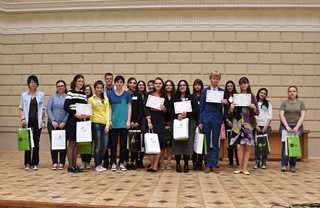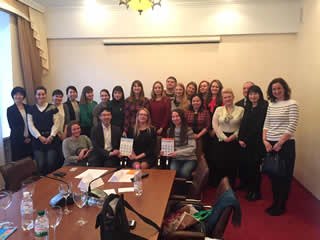Promoting Autonomy and Localization - The Year of Japan in Ukraine
Taras Shevchenko National University of Kyiv
MORITA Junko
Overview of Japan Foundation Teacher Activities in Ukraine
The Japan Foundation (hereinafter “JP”) currently has two Japanese-Language Specialists (hereinafter “Specialists”) and one Japanese-Language Assistant (hereinafter “Assistant”) dispatched to Ukraine. The Japanese-Language Specialists dispatched to Taras Shevchenko National University of Kyiv, to which I am assigned, will soon come to an end, leaving two members remaining. In addition to working at our assigned institutions, the Specialists and Assistants must provide support on a national level, including coordination and advice for Japanese-language education related programs geared towards learners and teachers throughout Ukraine.
First Regional Hosting of the “Ukrainian Japanese Speech Contest” and First Hosting of the “Ukrainian Sakura Japanese-Language Teacher Training Program”
Two major new challenges occurred last year involving Japanese-language educational programs.
The first was the hosting of the “21st Ukrainian Japanese Speech Contest”, a major event for Japanese learners in the country, outside the capital city of Kiev for the first time. Hosted by the Ivan Franko National University of Lviv in western Ukraine, it was a major challenge but ended successfully thanks to the efforts of the teachers at the University and the members of the cooperating and supporting organizations. While the next contest will be held in Kiev again, there are already regional cities showing interest in the 23rd contest. The event is supported by learners and teachers of Japanese throughout Ukraine, and in the future, I hope that the event develops to be held in regional cities every other year, in addition to Kiev, the capital of Ukraine.

Students participating in the 21st Ukrainian Japanese Speech Contest
The second event, the “Ukrainian Sakura Japanese-language Teacher Training Program,” was a new program held for teachers by the Japanese Teachers Association of Ukraine. To date, the organization has been hosting the “Ukrainian Japanese-Language Education Seminar,” a major event featuring guest teachers from Japan to which teachers of the Association attend from around Ukraine, and the 16th seminar was attended by 48 member teachers of the Association. The seminar serves as an important opportunity for the teachers to build a network, learn about new teaching methods, and gather information. However, given the need for participants to deepen their studies in elective subjects due to the diversity of their experience and specializations, a new program called the “Ukrainian Sakura Japanese-Language Teacher Training Program” was established to run in tandem with the seminar in which participants all learn together. Two themes were selected from the “Japan Foundation teaching Japanese series (in Japanese),” “Teaching Conversation” and “Improving Teaching Methods,” based on a survey given in advance, and teachers who participated in the “Training Programs for Teachers of the Japanese-Language (in Japanese)” held by the JF the previous year served as instructors. While many teachers would love to participate in training in Japan, the number we can accept is limited, so the event also served as a valuable opportunity for highly motivated teachers to contribute by sharing what they learned. Starting this year, “Training Program for Teachers of the Japanese-Language on a Specific Theme” will be held as part of the “Training Programs for Teachers of the Japanese-Language,” so the event will likely be helpful for Ukrainian teachers who are considering applying in the future. The survey given after the training included the comment that “there is no limit to improvement,” making it a great opportunity for the hosts to see how motivated the teachers are. I hope that the next one will be held.

Teachers who participated in the “Ukrainian Sakura Japanese-Language Teacher Training Program”
Future Prospects
As I mentioned above, the dispatch of Specialists to the Taras Shevchenko National University of Kyiv will come to an end. To date, we have given as much support as we can to the Ukrainian teachers so that they can manage the Japanese-language educational programs on their own, but even more autonomy and localization is required. Meanwhile, there are educational institutions outside Kiev that Specialists have not been dispatched to, and these too would benefit from dispatches or regular visits. Furthermore, while teachers and learners of Japanese in Ukraine have been concentrated at the higher secondary educational institutions, interest at the primary and lower secondary educational institutions is also heating up. Therefore, I believe the time has come for the role of JF Specialists and Assistants to promote the autonomy of institutions and regions that have matured and instead provide support for Japanese-language educational programs throughout the country while focusing on supporting new institutions and regions.
Growing Interest in Japan and Expectations for Bilateral Relations
Despite the high motivation and enthusiasm of Japanese-language learners and teachers in Ukraine, there are sadly few job opportunities where they can exercise their Japanese skills. However, I believe that deeper and more diverse personnel exchange and economic trade between the two countries would increase the opportunities available for Japanese learners.
2017 marked the 25th anniversary of diplomatic relations between the two countries. With the hosting of the “Year of Japan in Ukraine,” which saw a variety of cultural and exchange programs take place, I feel that interest in Japan has increased even more. I myself developed a program called Japan in Ukraine(being continued as “Minnanohata” after the Year of Japan) in which Japanese-language learners communicate to their peers about Japan using both Japanese and their native language. The website “Japanese-Language Specialists’ Report” is likely viewed by those interested in both Japanese-language education and Ukraine, and I hope the readers of this article also take a look at the messages from the Japanese-language learners in Ukraine. My hope is that interest in Japan among Ukrainians, and interest in Ukraine among the Japanese, continues to increase, and that the “Year of Ukraine in Japan” is one day held in the future.
- What We Do Top
- Arts and Cultural Exchange [Culture]
- Japanese-Language Education Overseas [Language]
- Japanese-Language Education Overseas [Language] Top
- Learn Japanese-language
- Teach Japanese-language
- Take Japanese-Language Test
- Know about Japanese-language education abroad
- The Japanese-Language Institute, Urawa
- The Japanese-Language Institute, Kansai
- Japanese-Language Programs for Foreign Specified Skilled Worker Candidates
- Japanese Language Education for Japanese Children Resident Overseas and for the Descendants of Migrants
- Archives
- Japanese Studies and Global Partnerships [Dialogue]
- JF digital collection
- Other Programs / Programs to Commemorate Exchange Year
- Awards and Prizes
- Publications
